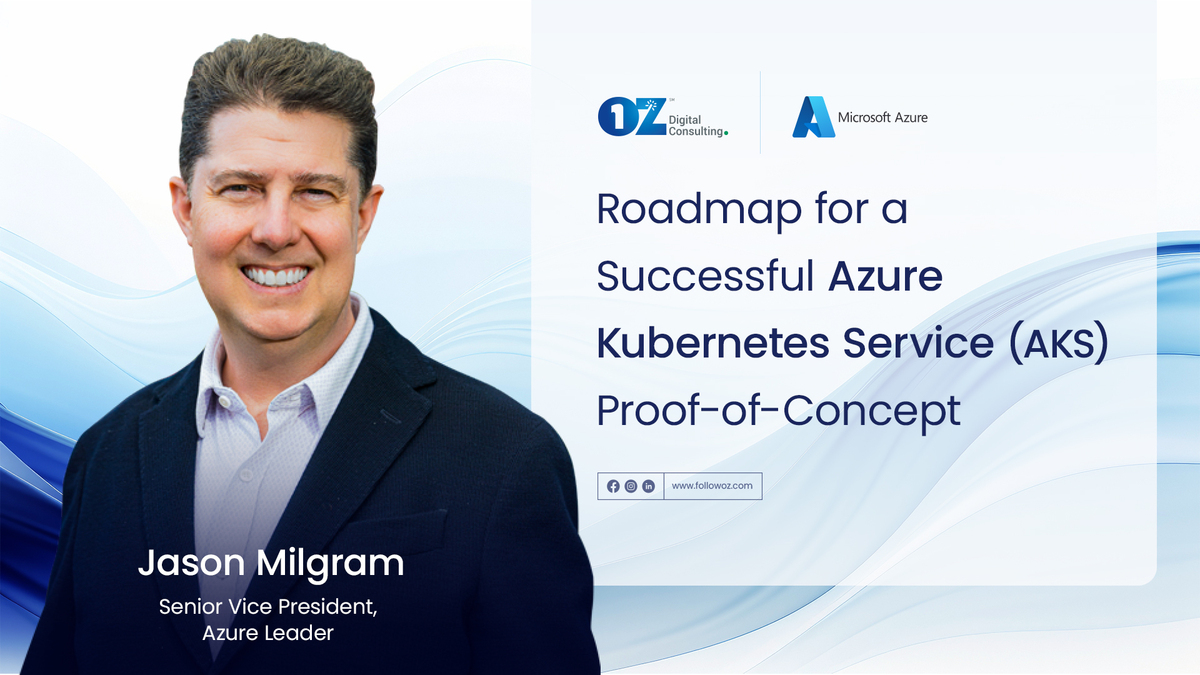By Jason Milgram, SVP Practice Leader, OZ Digital
Last week, we explored five major benefits of leveraging Azure Kubernetes Services (AKS) for business innovation.
Today, let’s get into the actionable details of creating a proof-of-concept (PoC) to serve as a bridge between speculative technology solutions and tangible, business-boosting results. (Remember, OZ is a certified Microsoft solutions partner—click here to schedule a consultation and take your business to the next level today.)
Embarking on a proof-of-concept (PoC) for AKS is a strategic endeavor that necessitates a clear blueprint to navigate the complex landscape of technology implementation.
Conceptualizing and executing an AKS PoC that aligns with business objectives and maximizes the potential for success will include…
- Strategic Planning. Strategic planning is the foundation of a successful AKS PoC. This stage involves a thorough analysis to align the PoC with core business objectives and define the technical requirements needed to achieve them. Establishing clear, measurable goals at the outset ensures that the PoC has direction and purpose, providing a benchmark against which success can be measured.
- Resource and Skill Assessment. A successful AKS deployment hinges on having the right mix of skills and resources. This involves candidly assessing current in-house capabilities and the infrastructure available to support the PoC. For gaps in expertise or resources, we will discuss strategies for leveraging external talent and technology partnerships to bolster the PoC’s prospects for success.
- Implementation Timeline. A meticulously crafted timeline is vital to managing the PoC effectively. We will address how to construct a feasible timeline that includes key milestones and review checkpoints, ensuring that the project stays on track and promptly addresses any issues. This schedule will serve as a project management tool, guiding all phases of the PoC from initiation to conclusion.
- Stakeholder Engagement. Stakeholder engagement is crucial throughout the PoC process. This section will explore strategies for involving internal and external stakeholders, ensuring their input and feedback are integrated into the PoC. We will also examine effective communication plans that keep all parties informed and engaged, fostering a collaborative environment conducive to the PoC’s success.
By addressing these critical areas, businesses can devise a robust framework for their AKS PoC, calibrated for evaluation, learning, and decision-making. This initiative-taking approach lays the groundwork for a PoC that assesses the technical viability of AKS and its strategic fit within the organization’s broader operational ecosystem.
Deliverables of an AKS Proof-of-Concept
A proof-of-concept (PoC) serves not just to validate the technical feasibility of Azure Kubernetes Service (AKS) but also to forecast its impact on business processes, cost, and overall strategic performance.
The output of a PoC is a collection of comprehensive deliverables that document every aspect of the trial, from technical specifics to business implications.
Essential deliverables that will provide a holistic view of AKS PoC outcomes include…
- Technical Evaluation. The technical evaluation is a cornerstone deliverable, encapsulating all AKS deployment and performance facets. This report will cover the configuration specifics, the performance benchmarks achieved, integration points, and any challenges encountered during the PoC. It serves as a reference document for understanding the technical dynamics of the AKS environment in a real-world setting.
- Business Impact Analysis. A PoC must translate technical capability into business value. The business impact analysis report provides a quantitative and qualitative assessment of AKS’s potential effects on business operations. It includes an analysis of return on investment (ROI), cost-benefit analysis, and the potential for operational improvement, offering decision-makers a clear view of the financial and strategic benefits.
- Risk Assessment Document. Mitigating risks is pivotal for any innovative technology adoption. This document outlines identified risks, potential impacts, and recommended mitigation strategies based on the findings from the PoC. It guides addressing uncertainties and planning for contingencies as organizations consider transitioning to a full-scale AKS deployment.
- Future Roadmap. Post-PoC, businesses need a strategic plan for scaling and fully integrating AKS into their operations. The future roadmap deliverable provides this, recommending the next steps for implementation, including scaling strategies, necessary training for staff, and a transition plan to move from PoC to full deployment.
- PoC Summary Presentation. A high-level summary presentation synthesizes all findings into a digestible format for executive review. This presentation highlights critical results, strategic insights, and a proposed action plan, allowing decision-makers to grasp the PoC’s outcomes quickly and make informed decisions about the future use of AKS.
Together, these deliverables form a comprehensive package offering a 360-degree view of the AKS PoC, guiding businesses toward informed decisions and successfully implementing Kubernetes technology.
Your Next Steps
As we conclude our exploration of the Azure Kubernetes Service (AKS) Proof-of-Concept (PoC), it is imperative to encapsulate the insights garnered and the foresight gained into how AKS can serve as a transformative agent for businesses.
In the rapidly shifting terrain of digital business, the agility provided by AKS is not merely advantageous but essential. The strategic importance of AKS lies in its power to streamline current operations and provide a scalable foundation for future growth and adaptability.
As a certified Microsoft partner with more than a quarter century of experience, OZ is uniquely positioned to help you bring the power of AKS to bear for your own enterprise.
Learn more here or reach out to schedule a consultation today.



